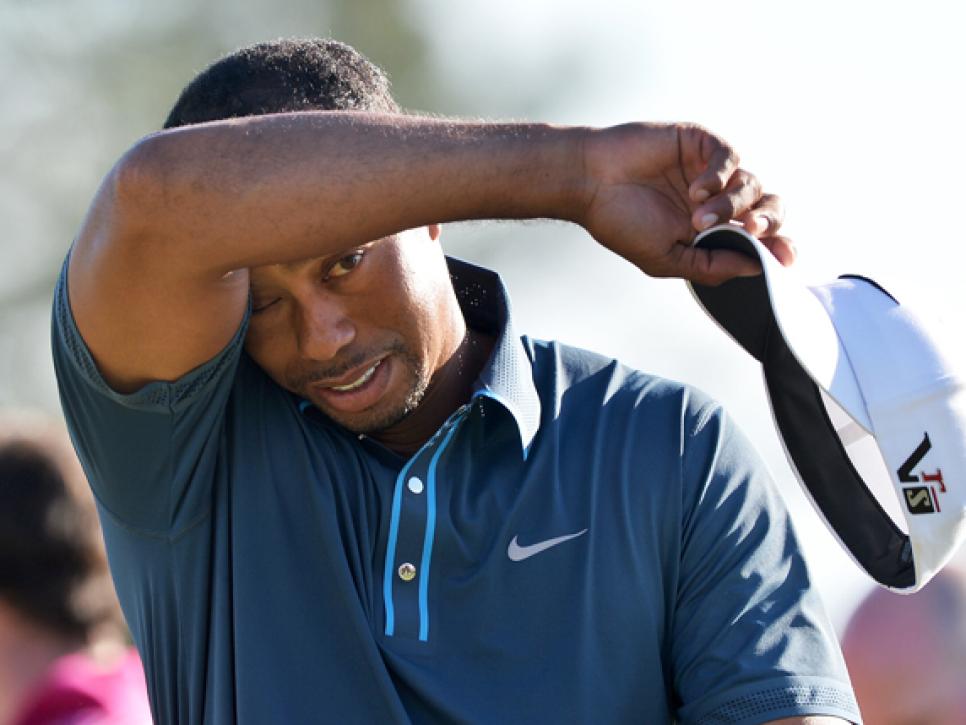News
What A Mess

Tiger wipes his brow after putting for par on the 18th hole.
AUGUSTA, Ga. -- From maybe three feet at the eighth hole, Tiger Woods tapped a putt that fell into the hole at the top-right edge. Wait, it didn't. It rolled another two or three inches before falling in at the right-center. Almost.
Now it gained speed, the devil's centrifugal force whipping it around the cup's bottom curve until it fell in at the left edge. Oh, no. Damn, damn, damn. It stayed out and now came back to the front edge where, slowing down, it would have fallen in except it didn't. Finally, all dizzied up, it finished its circumnavigation where it started, hanging on the right edge.
It was an all-timer lip-out, the full 360, an easy birdie transformed into as nasty a par as you'd ever want a man to suffer.
How could the thing stay out?
There's an even better question, though.
Why is Tiger Woods still playing in the Masters?
This takes some explaining, and we might start with the day the golf rules god, Joe Dey, descended through clouds from a mountaintop and declared, "Thou shalt not improve thy lie."
Golf's rules are arcane, dense, and sometimes pretty silly. What other sport calls a penalty the next day because a nebbish on his couch had Augusta National Golf Club on his speed-dial? But, really. Cut through the book's jungle of verbiage and it's clear that all righteousness begins by honoring that first commandment.
Most of the rule book's thousands of words say the same thing only in different ways, and anyone who ever played the game understands it. The penalty for improving your lie is two strokes, and everyone knows it. The penalty for not adding those strokes to your scorecard is disqualification, and everyone knows that, too.
Yet there he was Saturday afternoon, going two under par, a 70 that left him four shots behind the leaders Brandt Snedeker and Angel Cabrera. He even said he has "a great shot to win the championship."
The day before, remember, he had improved his lie. And he said so with some pride in his decision-making. He wanted to hit the same 85-yard shot that had ricocheted off the flagstick and back into the pond by the 15th green -- only he wanted to land it two yards shorter, so he decided to drop two yards behind the previous spot.
The repetition of the shot would be convincing evidence of his virtuosity (as if we needed any). The trouble was, the rule book calls for the drop to be made as "near as possible" to the spot from which the previous shot was struck. By his own admission in a press interview after the round, he said he dropped two yards back. Improving his lie, see?
He then hit a pretty shot within a couple feet of the cup and got out with a bogey. But then someone called Augusta National and said, like, "Hey, you notice what Tiger did?"
There began a series of events during which both the Masters and Woods did themselves no good. Even during the Friday round,Masters officials checked the video and decided all was OK. But when they heard of Woods' press interview, they got him out of bed Saturday morning to answer questions. He answered "forthrightly" and with "candor," an official said. He was given a two-shot penalty for "playing from the wrong place," but escaped disqualification because, after all, the Masters people had seen no reason to talk with him Friday about a violation.
So it would be wrong, they decided, to disqualify him. Happily for them, they could rely on the make-it-say-anything-you-want-it-to-say rulebook. Rule 33-7 gives officials leeway in deciding disqualifications; basically, if the player couldn't have known he broke a rule, he can skate.
There's another rule, of course. Rule 20-7 includes language that says a player shall not "gain a significant advantage as a result of playing from a wrong place."
Did Woods gain significant advantage?
He said he did.
The rule goes on. "If a competitor has committed a serious breach and has failed to correct it, he is disqualified."
Well?
Well, maybe a four-time Masters winner with 10 other major championships is cut some slack that a tournament might not cut for, say, a 14-year-old Chinese kid.
There's a case to be made that Woods was penalized sufficiently. What might have been a birdie four at the 15th wound up being a triple-bogey eight. Even the two-shot penalty is enough to lose most any major. It certainly doesn't seem fair to disqualify him when tournament officials didn't do their own job well.
And yet there is the matter of golf's unique place in sports. Only in golf are the competitors also the referees. They police themselves and they police others. Many a player would have stopped Woods from the incorrect drop. (By the way, he said that happened because he was "a little ticked" at the misfortune of the first shot kicking back into the water. He also said he "wasn't even really thinking," which is news, considering he'd earlier said he had thought enough to plan the drop two yards back.)
It is, then, a game of honor. Players report their own transgressions. Had Woods done the right thing Saturday morning, he would have admitted his mistake was so egregious that he should withdraw from the tournament. It would have been the best public relations move of his career, especially doing it at the place Bobby Jones built.
When I said as much to a friend, he looked at me with more than a touch of incredulity.
And he said, "Tiger don't roll like that."

